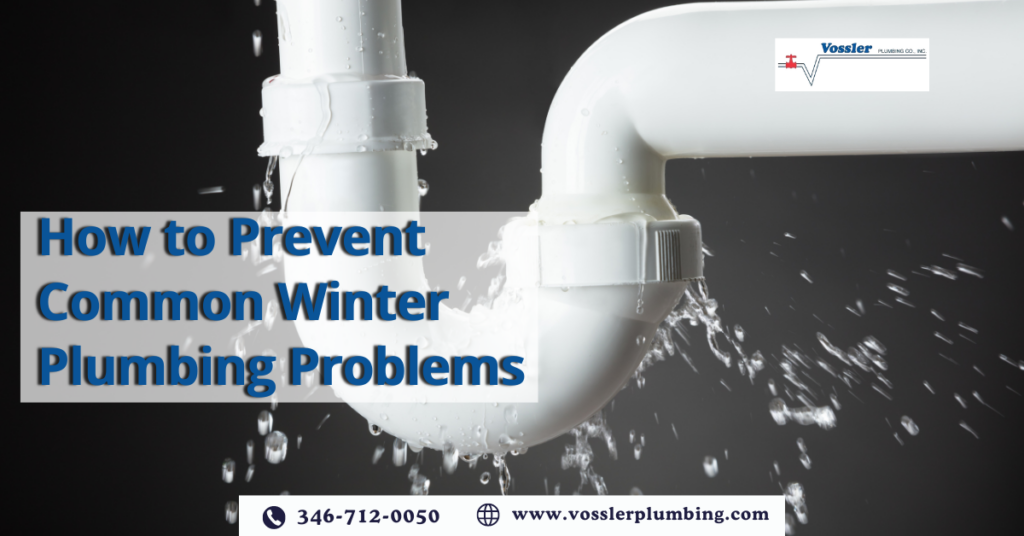As the winter season approaches, it’s time to brace ourselves for chilly temperatures, cozy evenings by the fireplace, and unfortunately, potential common winter plumbing problems. The drop in temperature can wreak havoc on your pipes, causing a range of issues that can disrupt your daily routine.

Here are some of the most common winter plumbing problems, and we will provide you with effective prevention tips to keep your plumbing system running smoothly all season long.
When the mercury dips below freezing, the risk of frozen pipes becomes a harsh reality. The expansion of water as it freezes can cause pipes to burst, leading to costly repairs and water damage.
To prevent this nightmare scenario, consider the following preventive measures:
– Wrap vulnerable pipes with insulating material to provide an extra layer of protection against the cold.
– Maintain a consistent indoor temperature, even when you’re away, to keep the pipes warm.
– Allow a small trickle of water to flow through your faucets. This can help prevent pipes from freezing, as moving water is less likely to freeze.
Winter brings its fair share of festivities, but it also brings an increased risk of clogged drains. Holiday cooking, excessive food waste, and improper disposal can all contribute to this issue.
Here’s how you can prevent clogged drains:
– Place drain strainers over your drains to catch food particles, hair, and other debris before they can cause a blockage.
– Avoid pouring grease down the drain. Instead, collect and dispose of cooking grease in a sealed container to prevent it from solidifying in your pipes.
– Be mindful of what goes down the toilet. Only flush toilet paper and human waste, as flushing items like wipes or feminine hygiene products can lead to clogs.
There’s nothing worse than waking up to a freezing cold shower during the winter months. A burst water heater can leave you shivering and frustrated.
To prevent this unpleasant surprise, take the following precautions:
– Schedule regular maintenance to have your water heater inspected annually by a professional to ensure it’s in good working condition and to address any potential issues before they escalate.
– Wrap your water heater with an insulating blanket to reduce heat loss and improve its efficiency, especially if it’s located in an unheated area.
– Set your water heater’s temperature to a moderate level to prevent overheating and potential damage.
Outdoor faucets and hose bibs are particularly vulnerable to freezing temperatures. When water trapped inside them freezes, it can cause pipes to burst. To prevent this:
– Disconnect and store garden hoses during the winter months.
– Install freeze-proof outdoor faucets if possible.
– Use faucet covers or insulating materials to protect outdoor fixtures from freezing.
The colder weather can exacerbate existing plumbing issues, including leaks in faucets and pipes. Inspect your fixtures regularly and address any leaks promptly to prevent water waste and damage.
Winter weather can affect septic systems by slowing down the breakdown of waste due to lower temperatures. To keep your septic system in good shape:
– Be mindful of excessive water usage during the winter to prevent overloading the system.
– Insulate the septic tank and pipes if they are exposed to extreme cold.
– Schedule regular septic system inspections and maintenance to catch potential issues early.
In some cases, cold weather can lead to a drop in water pressure. This can be caused by freezing or partially frozen pipes, as well as pressure fluctuations in the municipal water supply. To address water pressure problems:
– Monitor your water pressure and address any sudden drops promptly.
– Insulate pipes to prevent freezing and maintain consistent water flow.
– Contact your water utility company if you suspect the issue is related to the municipal supply.
For properties with hydronic heating systems, maintaining boilers and radiators is crucial in the winter. Neglected boilers can lead to heating system failures, and poorly maintained radiators may not distribute heat effectively. To avoid heating issues:
– Schedule annual boiler maintenance to ensure efficient and safe operation.
– Bleed radiators to remove trapped air, which can hinder their heating capacity.
– Insulate pipes connected to the boiler to prevent heat loss.
If you have an automatic sprinkler system for your landscaping, it’s essential to drain it before the first freeze. Any water left in the system can freeze and damage the pipes and sprinkler heads. Follow the manufacturer’s instructions or consult a professional for proper winterization.
When these common winter plumbing problems occur, don’t wait to take action. If you need professional assistance, call Vossler Plumbing Services for fast, reliable plumbing repairs.
Give us a call at 713-688-2304 or reach out to us.
Remember, a little prevention can go a long way in keeping your plumbing system functioning flawlessly throughout the winter season. Stay warm and worry-free!
Whatever you’re experiencing, we have the technical expertise to help. Click below to share your information along with any specific details or photos, and we’ll be in touch with you as soon as possible with an estimate.